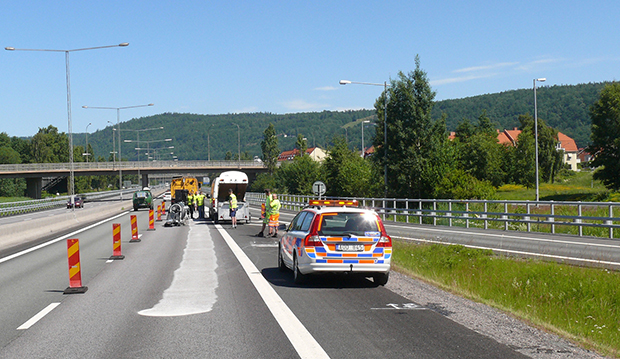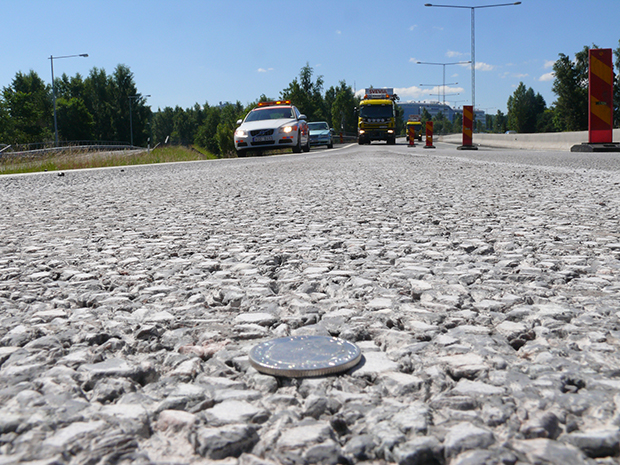A test carried out by VTI shows that ground asphalt produces less noise and reduced emissions.
It has been known for a long time that grinding a concrete floor leads to reduced wear by trucks and other vehicles. But is it also possible to grind roads to make the asphalt smoother, with reduced noise and decreased fuel consumption without a deterioration in friction? It seems as if this question can be answered in the affirmative, at least that was the case in a recent test.
Ulf Sandberg, a researcher at VTI, has carried out a test on a section of the E4 highway around the city of Huskvarna which now has a road surface of noise-reducing asphalt.
A 65-metre long and just under a metre wide strip was ground with a type of grinding machine manufactured by the company HTC Sweden and sold for grinding concrete floors. When a concrete floor is to be ground, the whole surface is to be made smooth, while here it is a matter of just a few millimetres which are to be ground away to even the surface of the asphalt’s hard stones. The surface must still be a bit rough to avoid increasing the risk of aquaplaning.

The ground surface completed test on the section of the E4 highway around Huskvarna. Photo: Ulf Sandberg
Road surfaces function so that rolling resistance increases when there are large stones in the mixture and usually also the noise increases. If the mixture contains small stones, the wear increases. The aim is to find a surfacing that is durable but as even as possible in order to reduce noise and fuel consump¬tion, but which still allows water to drain off.
In this first test, grinding of the road surface produced exactly the positive effects that were intended. Despite the asphalt already being noise-reducing on this section, the noise decreased due to the grinding by 1–3 dB and rolling resistance decreased by 4–7 per cent.
“This is a promising result, which we want to continue to work on,” says Ulf Sandberg at VTI. “Consequently, from September 2013 these initial results have led to the start of a new and much larger project involving several partners and sponsored by MISTRA.”
Mattias Lindahl, university lecturer at the Department of Environmental Technology and Management at Linköping University, Sweden, is also involved in the new project:
“This is a very interesting result, which shows the potential of this technology. We hope now to make further progress and investigate life cycle costs, both financial and environmental, and make additional tests, both in the VTI laboratories and on roads and streets,” he says.
Many questions remain to be dealt with. It is quite clear that grinding is a relatively cheap measure in comparison to other noise-reducing methods, but how durable are the positive effects? According to VTI’s initial tests on the heavily trafficked E4 motorway, the effect had disappeared after a year. Is there a difference between roads with high wear and those with less traffic?
“We know that roads in densely populated areas such as the Netherlands occasionally are ground to reduce the noise levels. Here in Sweden, it would probably be economic to grind certain roads regularly, not least to avoid rut formation,” says Mattias Lindahl.
Text: Andreas Schander
 Contact: Contact:Ulf Sandberg ulf.sandberg@vti.se VTI, Sweden |







Follow us: